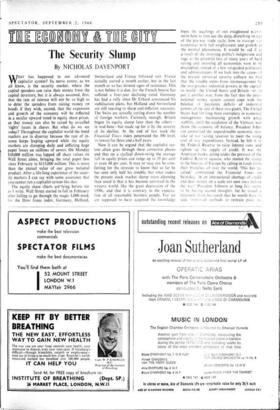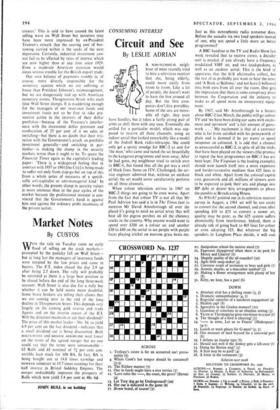The Security Slump
tErKE MICAH nE con
By NICHOLAS DAVENPORT
WHAT has happened to our advanced capitalist system? Its nerve centre, as we all know, is the security market, where the capital spenders can raise their money from the capital investors, but it is always assumed, first, that the rate of interest will not be so high as to deter the spenders from raising money on bonds if they wish, second, that the expansion and growth of the economy will be reflected in a secular upward trend in equity share prices, so that money can also be raised by so-called 'rights' issues in shares. But what do we see today? Throughout the capitalist world the bond markets are in disarray because the rate of in- terest keeps leaping upward while the equity markets are slumping daily and inflicting huge paper losses on millions of savers. On Monday $10,000 million was lopped off share values on Wall Street alone, bringing the total paper loss since February to $115,000 million. This is more than the annual value of our gross national product. After a life-long experience of the secur- ity markets I can say with some assurance that you cannot run a capitalM system like that.
The equity share charts are' lying before me as I write. Wall Street started to fall in February after failing to go through the magic 1,000 mark for the Dow Jones index. Germany, Holland, Switzerland and France followed suit. France actually started a month earlier, but in the last month or so has showed signs of resistance. This is not before it is due, for the French bourse has suffered a four-year declining trend. Germany has had a rally since Dr Erhard announced his stabilisation plans, but Holland and Switzerland are still reacting to sharp anti-inflation measures. The Swiss are actually cutting down the number of foreign workers. Curiously enough, Britain began its equity slump later than the others— in mid-June--but made up for it by the severity of its decline. At the end of last week the Financial Times index penetrated the 300 level, its lowest for three and a half years.
Now it can be argued that the capitalist sys- tem often goes through these corrective phases and that on a cyclical down-swing the average fall in equity prices can range up to 35 per cent or even 40 per cent. It may or may not be com- forting for the investor to know that so far he has seen only half his trouble, but what makes the present stock market slump more alarming than usual is that it has become universal in the western world, like the great depression of the 1930s, and that it is contrary to the expecta- tion of all reasonable business people. For we are supposed to have acquired the knowledge
from the teachings of our enlightened econo- mists how to iron out the deep, disturbing swings of the pre-war trade cycle, how to manage 0 T economies with full employment and growth as the normal phenomena. It would be sad if as a result of the investing public's indignation and rage at the potential loss of many years of bard saving and investing all economists were to be discredited instead of a few misguided politicians and administrators. If we look into the causes of the present universal security collapse we find that the trouble sterns from mismanagement by the two greatest industrial powers in the capital- ist world—the United States and Britain--or, to put it another way, from the fact that the inter- national money system cannot cope with the balance of payments deficits of industrial powers of the size of these two giants. The United States had for long been exemplary in economic management, maintaining growth with price stability, until the escalation of the Vietnam war threw the economy off balance. President John- son committed the unpardonable economic mis- take of not raising taxation to meet the rising cost of IA ar expenditures. Instead, he left it to the Federal Reserve to raise interest rates and tighten up the supply of credit. It was the American banks, acting under the pressure of the Federal Reserve squeeze, who started the slump in the bourses of Europe by calling in funds from their branches all over the world. 'This has re- sulted,' commented the Financial Times on Saturday, 'in an international shortage of credit and dear money on a scale not seen since before the war.' President Johnson at long last seems to be ha% ing second thoughts, for he issued a statement from his ranch that he would base to seek 'improsed methods to restrain price in-
creases.' This is said to have caused the latest selling wave on Wall Street but investors may have been more impressed by ex-President Truman's remark that the soaring cost of bor- rowing carried within it the seeds of the next depression. Certainly, industrial investment can- not fail to be affected by rates of interest which are now higher than at any time since 1929. Even a moderate American recession would mean serious trouble for the British export trade.
Our own balance of payments trouble is, of course, more directly responsible for the monetary squeeze which we are suffering at home than President Johnson's mismanagement, but we are dangerously tied up with American monetary events. Throgmorton Street wilts each time Wall Street slumps. It is maddening enough for the managers of our insurance funds and investment trusts not to be free to take pre- ventive action in the interests of their dollar portfolios-because of the Treasury's interfer- ence with the investment dollar premium and confiscation of 25 per cent of it on sales or switching-but there is no doubt that their irri- tation with the Government's attack on portfolio investment generally-and switching in par- ticular-is making the slump in the security markets worse than it ought to be. To quote the Financial Times again as the capitalist's leading paper : 'There is a widespread feeling that in contrast with 1957 or 1961 [the City] is being made to suffer not only from stop-go but on top of this from a whole series of measures of a spetifi- cally anti-capitalist or anti-managerial kind.' In other words, the present slump in security values is more ominous than in the past cycles of the market because the professional investor is con- vinced that the Government's hand is against him and against the ordinary profit incentives of the private sector.































 Previous page
Previous page